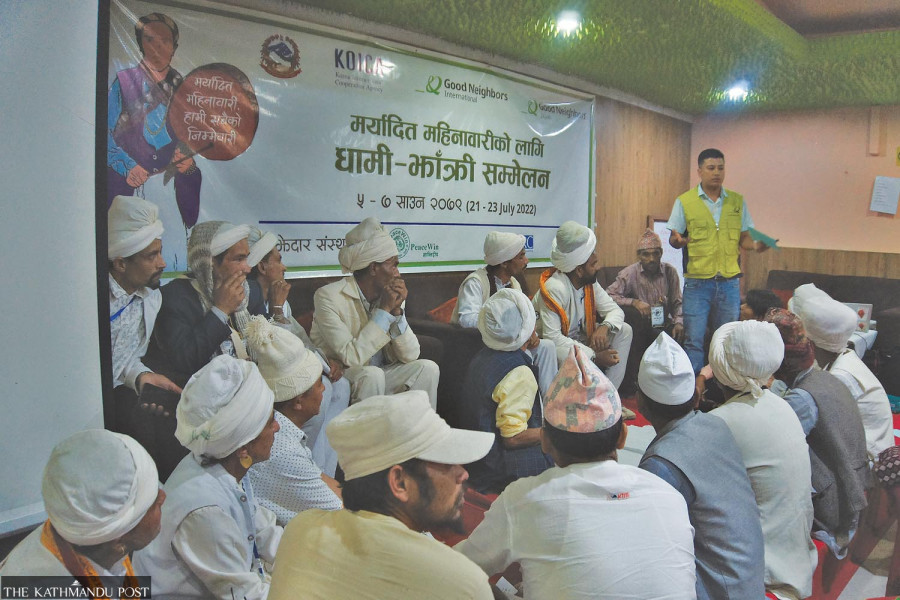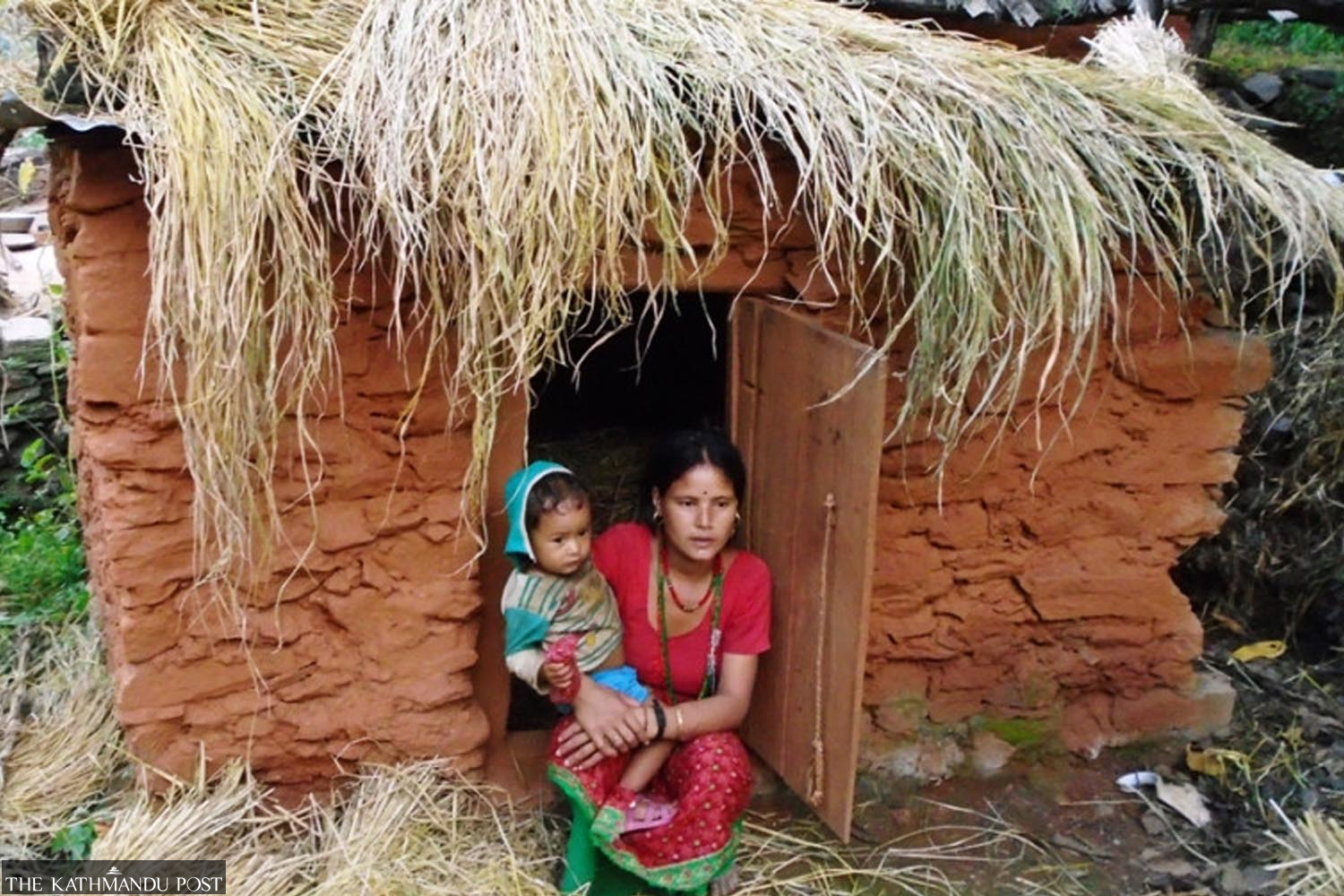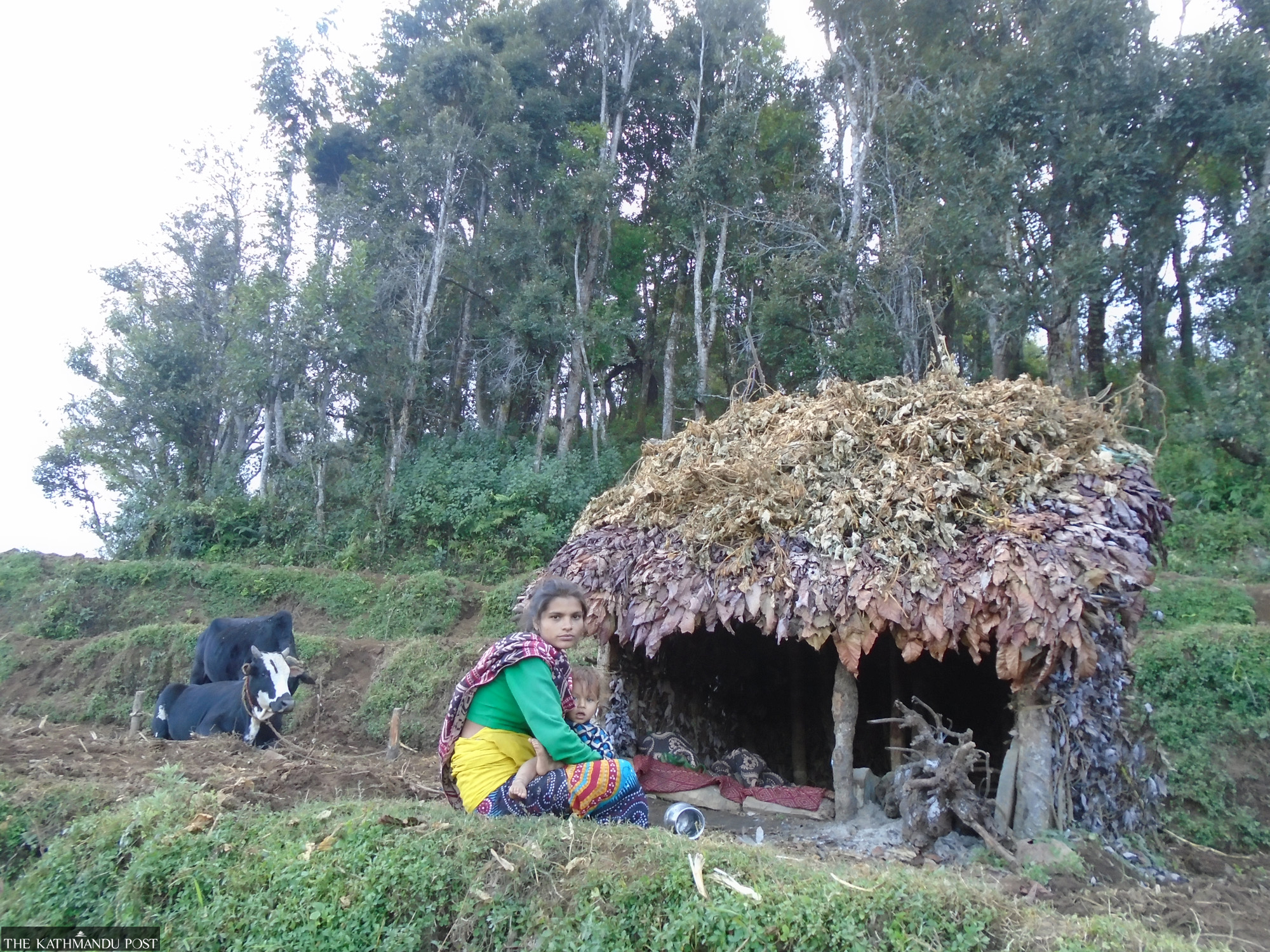National
Employing dhami-jhankri to promote dignified menstruation
Faith healers commit to ensuring dignity of menstruators in Sudurpaschim and Karnali.
Aakriti Ghimire
Kausi Kunwar would never tell her family about her periods. She used to do all the regular chores during her menstruation.
“Even my 76-year-old mother-in-law and my husband would eat what I cooked,” said Kunwar, a resident of ward 4 in Chaurpati Rural Municipality, Achham. “I was 22 when my husband suggested that I need not tell anyone about my menstruation and can stay inside the house.”
But then, one day, she shared—that she was menstruating. And all hell broke loose.
Soon, it became common knowledge in the village that she didn’t follow any restrictions. As upholders of customs, traditional faith healers lashed out at her.
“The dhamis began chanting that I should be killed,” recalled Kunwar, now 40.
Dhami and jhankri are traditional faith healers or ritual practitioners believed to possess the ability to embody local deities or spirits. They influence the communities, and experts say they are the prime enforcers of menstrual discrimination in Sudurpaschim and Karnali provinces.
Over the years, there have been multiple efforts to end the taboo of menstruation in farwestern Nepal—from awareness campaigns to dismantling period huts—without much success.
Activists say there is a realisation that until community influencers like dhami-jhankri are made aware and employed, it would be difficult to rid the society of the centuries-old scourge that has been taking a toll on women and their health.
“After years of work around menstrual hygiene management, we recognised that without an integrated approach focusing on behavioural change and involving dhami-jhankri, a holistic change is impossible,” said Ram Naresh Yadav, head of Public Health Department at Good Neighbors International (GNI), a humanitarian and international development organisation. “Locals listen to what dhami-jhankri say and we need to utilise them to instigate change.”
A 2019 research in Dailekh found that dhami-jhankri are strong promoters of social norms linked with religion and culture, including menstrual taboos.
“Various forms of restrictions around menstruation are created and controlled by dhami-jhankri,” said Radha Paudel, an advocate for dignified menstruation. “In the name of religion, culture, God, and prestige, they enforce a culture of fear, ignorance and silence around menstruation, which in turn violates a multitude of constitutional rights of women and impacts the dignity, self-respect, self-confidence and self-esteem of menstruators.”
Menstrual exclusion practices are rampant across Nepal, with stricter observances in Sudurpaschim and Karnali provinces. Many are prevented from accessing toilets, water for sanitation and nutritious food and are still exiled from their homes.
Due to such discriminations, many women have lost their lives to cold, smoke, wild animal attacks, snake bites, extreme cold, lack of oxygen and carbon dioxide poisoning in menstrual huts. The practice of such ostracisation is called Chhaupadi.

Chhaupadi-free drives, however, remain ineffective, given the lack of groundwork on changing the mindset of the locals.
A 2018 study finds that 72 percent of girls are still banished from their homes to either menstrual huts, animal sheds or courtyards outside homes where some have been physically abused and bitten by snakes.
Locals in the region consult dhami-jhankri for all issues—from health concerns to managing conflicts. They act not only as traditional healers but also community-level mediators, as they are believed to “possess spiritual powers.”
“Residents come to my place to seek remedies. Some come with complaints of theft of their cows and buffaloes. Some come with issues of property. Some come to find their lost husbands in India. Then the God speaks [through me],” said Bhakta Bahadur Aidi, a dhami from Triveni Municipality-4, Bajura district.
Chandra Bahadur Rokaya, also a dhami from Gaumul Rural Municipality-6 in Bajura, said there are around 50-60 dhamis in his village who look to him for guidance.
Dhami-jhankri deny their roles in enforcing menstrual exclusion practices in their communities. Instead, they blame young girls and women for keeping themselves at bay during menstruation.
“This discrimination isn’t because of us, or the men,” said Rokaya. “The womenfolk themselves are responsible. Women don’t go to water and food sources or temples, even though they have never been told to do so.”
However, Kunwar’s story evidenced otherwise.
Outraged at Kunwar’s defiance of the norms of menstrual segregation, dhamis attacked her and defamed her and her family.
“They threw what they called ‘spiritually significant rice’ at me to drive away the ‘negativity’ I possessed. They said that my actions angered the gods and would uproot the entire community,” said Kunwar.
To determine what roles dhami-jhankri play in enforcing menstruation restrictions and how they can be utilised to end the period taboo, grassroots organisations recently held a three-day “Traditional Healers’ Conclave for Dignified Menstruation” in Dhangadhi from July 21-23.
It brought together 33 traditional healers and 14 elected officials, adolescent girls, women, and government functionaries of local and provincial governments from various districts—Bajura, Doti, Achham, Mugu and Kailali.
The conclave was part of a three-year Health Rights Improvement Project of the GNI, funded by the Korea International Cooperation Agency (KOICA).
It concluded with a declaration, signed by all the dhami-jhankri in attendance, committing to ensure equal treatment of young girls and women on all days—both while menstruating and not menstruating.
They also committed to acting as informants about dignified menstruation and taking special initiatives to create a dignified menstrual environment at home and in their communities.
“I am a member of the Education Development Board in my ward, and I will make sure to bring this up there,” said Aidi, the dhami from Bajura. “When I go back, people will ask me what the conclave that I attended was about. I am accountable to them and I will tell them what I learned here.”

Rokaya echoed Aidi, committing to raising concerns about menstrual exclusion practices in his family and among municipality members.
However, dignified menstruation activists are wary of the limitations of such events. They say that despite extensive training with declarations, women and girls might be forced to lead undignified lives.
“It isn’t just about access to menstrual products. Will I get to sit and eat with my brothers and fathers? Can I enter the kitchen or touch water sources? Can I partake in social and religious activities?” asks Paudel, who is also the founder of the Global South Coalition for Dignified Menstruation. “If not, then where is my dignity?”
Activists say it is insufficient to talk about where women live during menstruation; it’s about ‘how’. Farwest will simply become another Kathmandu where women stay within the homes but menstruation is still a taboo, according to them.
“If we fail to educate dhami-jhankri on dignified menstruation practices—which demand equal treatment of girls both during menstruating days and non-menstruating days—we cannot guarantee their dignity,” said Paudel.
Some dhamis admit that they cannot eradicate menstrual discrimination completely.
“We demolished chhau goths—menstrual huts—ourselves. Now women stay inside their homes. They have water, they have access to toilets. But I can’t go and drink the water they touch. I can’t,” said Govindra Bahadur Buda, 22, who has been a dhami for the past 14 years. “Why should I lie about it? It will take a lot of time to eradicate these practices.”
Despite the attempts of dhami-jhankri to uphold such discriminatory practices, women in the farwest are opposing in their capacities.
Kunwar first rebelled when she was 22. She is 40 today.
When she was 25, she became ‘possessed by a deity’ herself, she says.
However, contrary to expectations, she still gets ‘possessed’ during her menstruation. She said she continues to defy menstrual exclusion norms even though the deity has chosen her body to reside in.
“Why did God choose to possess me if he deemed me impure?” Kunwar asks, confronting men dhami-jhankri. “I’m a dhami and I menstruate.”




 16.16°C Kathmandu
16.16°C Kathmandu













